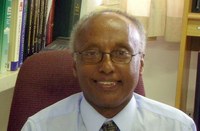 It was launched at a TWAS conference held in Trieste, Italy, in 1985. Today, with nearly 190 members, it is recognized as a leading voice for science and development in Africa. In February, the Kenya-based African Academy of Sciences (AAS) announced the appointment of a new executive director: Berhanu Molla Abegaz, one of Africa's leading chemists and founder of the Chemical Society of Ethiopia and the Bulletin of the Chemical Society of Ethiopia.
It was launched at a TWAS conference held in Trieste, Italy, in 1985. Today, with nearly 190 members, it is recognized as a leading voice for science and development in Africa. In February, the Kenya-based African Academy of Sciences (AAS) announced the appointment of a new executive director: Berhanu Molla Abegaz, one of Africa's leading chemists and founder of the Chemical Society of Ethiopia and the Bulletin of the Chemical Society of Ethiopia.
Abegaz's vision for AAS is at once simple and bold. He hopes to enhance the Academy's position as a key player for the advancement of science, technology and innovation (STI) across the continent. "I would like to see AAS become a compelling force in efforts to devise a continent-wide strategy for the development of STI," he says.
"Africa enjoys an enormous wealth of natural resources," Abegaz says, "and it is also home to a youthful population eager to acquire the knowledge and training they need to compete in today's global economy. What has often been missing," he adds, "are clear and credible roadmaps for development that draw on the continent's inherent strengths. Institutions like AAS can assist in the design of such roadmaps and in overseeing research and training programmes that will help ensure that progress is made."
To successfully assume these roles, Abegaz maintains that the AAS should continue to identify and elect the continent's most eminent scientists as members. "AAS's reputation – and ultimately its impact – will depend largely on the quality and reputation of its members," he explains. That is why one of his highest priorities will be to increase the Academy's membership without compromising its focus on excellence.
Abegaz, who took up his office in March 2011, succeeds Thomas Egwang (TWAS Fellow 1997) and Gideon Okelo (TWAS Fellow 1989). AAS's founding director and president, ThomasOdhiambo (TWAS Founding Fellow, photo), who died in 2003, is an iconic figure in science in Africa, serving as the driving force behind the creation – and then as the long-time head – of the International Centre of Insect Physiology and Ecology (ICIPE). In the 1980s and 1980s, Odhiambo was one of the leading voices for an African renaissance.
"The research and training initiatives that Odhiambo and his successors put in place at the AAS should be continued," notes Abegaz. "They have provided a strong foundation for building the knowledge base and skills that Africa needs to meet the continent's formidable challenges in science and development. That's true whether the issue is agriculture, forestry, energy or biodiversity conservation."
What the AAS needs to do," he says, "is to refurbish these initiatives to ensure that they meet the needs of scientists and society today,"
For example, he notes that "a growing number of African countries are making significant strides in improving education and training in science and other fields." However, he adds that these efforts have fallen short when it comes to applying knowledge and skills to development. "Turning science into innovation," he observes, "has often been difficult to achieve."
Abegaz acknowledges that Africa should honour its past and he emphasizes that it is essential for the continent to protect and preserve its indigenous cultures and traditions.
But he is quick to add that cultures and traditions "should not be treated as museum pieces" but instead should serve as sources of continental collaboration that help to nurture more prosperous and confident communities and societies. He points to two successful networks – the Natural Product Research Network for Eastern and Central Africa and the Network for Analytical and Bio-Assay Services in Africa – as examples of continent-wide collaboration that have stood the test of time and that could serve as models for researchers in other fields.
"Harmony and sustainability are in Africa's DNA," he observes. "Such attributes have helped the continent survive difficult times. I hope that we can tap into the same attributes to help grow our economies and modernize our societies. The AAS stands ready and eager to help in this effort."
For additional information about the African Academy of Sciences, see www.aasciences.org.

